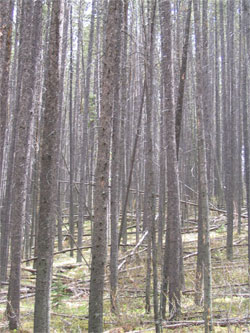Why are healthy forests important?
 |
Healthy mountain forests are important for many reasons:
- they provide homes to thousands of species of birds, animals and insects;
- they store, protect and supply fresh water to communities;
- they store carbon from the atmosphere and prevent it from contributing to global warming;
- they conserve soil and increase its productivity;
- they are a part of nutrient cycling;
- they help control floods;
- they supply oxygen.
 Spray Valley in Banff National Park. Spray Valley in Banff National Park.© Parks Canada / Ian Pengelly |
Not in this case! This uniform, mature stand may look healthy from a distance, but take a closer look: there is little diversity in forest age, species and structure. Accumulation of lots of dead wood can contribute to large wildfires. Currently, the mountain national parks have many aging pine stands, partly due to a history of fire supression. Park managers are working to restore diversity to the landscape.
 Doghair Pine Forest in Banff. National Park. Doghair Pine Forest in Banff. National Park.© Parks Canada / Heather Dempsey |
 Dense Lodgepole Pine Forest Canopy in Banff National Park. Dense Lodgepole Pine Forest Canopy in Banff National Park.© Parks Canada / Heather Dempsey |
What are the roles of insects like mountain pine beetle in a forest?
Pine forests often succumb to insects or disease as they age. When mountain pine beetle kill a pine tree, they create habitat for a variety of animal and plant species. Other tree species and plants that have been growing alongside or underneath that pine now have more light in which to grow. These new species in turn support other wildlife by providing shelter and food. Insects help forests recycle nutrients by assisting in the breakdown of trees and plants into organic matter. Nutrients are returned to the soil where the cycle begins again.
- Date modified :